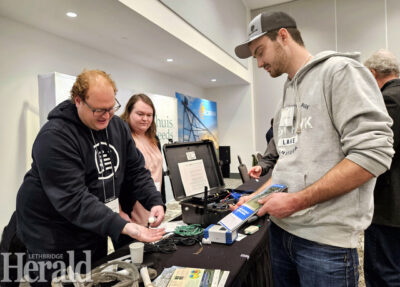Irrigation conference readies farmers for upcoming season
By Lethbridge Herald on January 23, 2025.
 Lethbridge Polytechnic field technician Brady Sherwood, left, demonstrates a sensor used in irrigation, to Martin Vandijk, right, as colleague Blaire Harley looks on at the tradeshow during the 2025 Irrigated Crop Update conference Thursday at the Agri-food Hub and Trade Centre.
Sunny South News photo by Kristine Jean
Lethbridge Polytechnic field technician Brady Sherwood, left, demonstrates a sensor used in irrigation, to Martin Vandijk, right, as colleague Blaire Harley looks on at the tradeshow during the 2025 Irrigated Crop Update conference Thursday at the Agri-food Hub and Trade Centre.
Sunny South News photo by Kristine JeanKristine Jean – SOUTHERN ALBERTA NEWSPAPERS – ssnews@sunnysouthnews.com
Hundreds of participants gathered at the Agri-food Hub and Trade Centre on Thursday for the 2025 Irrigated Crop Production Update, hosted by Lethbridge Polytechnic in partnership with industry, farmers, academic partners and government representatives from across western Canada.
The one-day conference featured several presentations and keynote speakers that spanned a variety of topics including future water for Alberta’s irrigation districts, prairie irrigation scheduling and strategies, disease trends in irrigated crops, understanding and managing herbicide resistance, and a farmer panel that discussed challenges and water management in 2024.
Willemijn Appels, senior research chair with the Mueller Irrigation Research Group at Lethbridge Polytechnic, spoke on sensors for irrigation management during the conference and pointed out differences in farming that use irrigation.
“Agronomy updates delve into a lot of practical programs, but something that’s really dedicated to irrigation is needed as well because you will see different diseases, you’ll need to do different practices, you have this whole concern with when to apply water that the others don’t have,” said Appels. “So it’s good to get an update on that.”
She said the annual conference aims to provide information on a variety of topics, updates and discussion related to irrigation and irrigated crops.
“We tried to be broader and make sure it contains new and upcoming technology but also what are people currently doing, what’s working and what is not working, what are the challenges that you face and how do we go about changing those or adapting to what might come,” explained Appels.
Glen Hofer, a farmer with Cameron Farms north of Taber, was attending the irrigated crop production update for the third straight year and said the annual event was very informative and beneficial for farmers.
It helped him prepare for the current crop year and the upcoming irrigation season, including, deciding what types of crops to grow.
“Can I take the risk to grow the high water usage crops or should I scale back and grow less water use crops,” said Hofer, noting the conference also helps with long-term planning, as many farmers work with a four or five year crop rotation.
“The availability of water has a big impact on how you plan your growing seasons for the next few years,” he added, noting his crops inlcude seed canola, corn, silage and pinto beans, among other items. “I’ve always used the information that I’ve gathered (here) to plan the crop year.”
One of this year’s presenters, Evan Derdall, an irrigation and drainage engineer, science and technology branch with Agriculture and Agri-Food Canada, shared information on an updated prairie irrigation scheduling manual, that is a collaborative, multi-province resource.
“There’s not a lot of irrigation expertise across the prairies so we’re trying to partner together to help develop a manual that can be utilized across the prairies,” said Derdall. “This is an introduction to irrigation scheduling. It provides a lot of examples, a lot of data and a lot of different scenarios that hopefully will fit somebody’s irrigation management,” he added, noting not all irrigation schedules have to be used. “It’s trying to give you a bunch of different options to find something that works with your farming system.”
The one-day conference also featured a trade show with about two dozen exhibits, displaying information on agricultural and irrigation-related products and services, and following presentations, the Regional Innovation Network of Southern Alberta (RINSA) held an irrigation applied research networking event.
15-14


